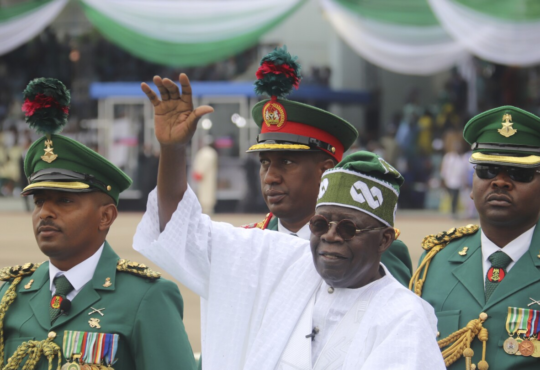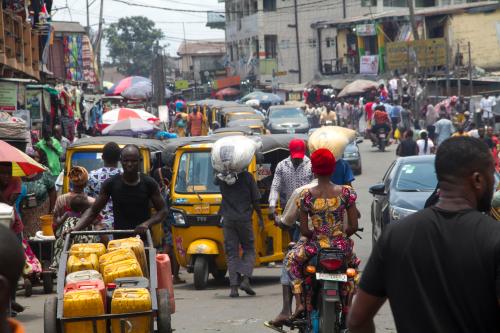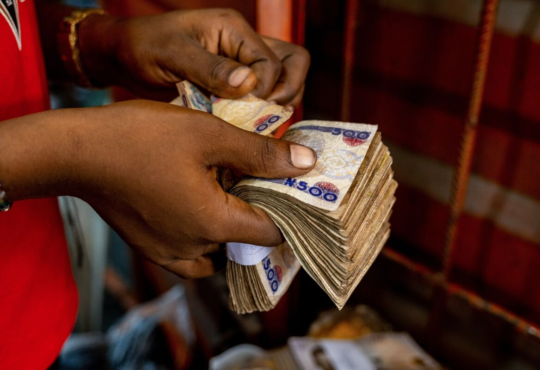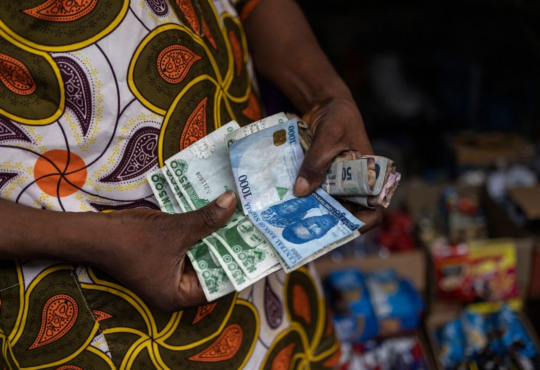Will free market solutions President Tinubu turn around Nigeria? – Geopolitical Intelligence Services AG
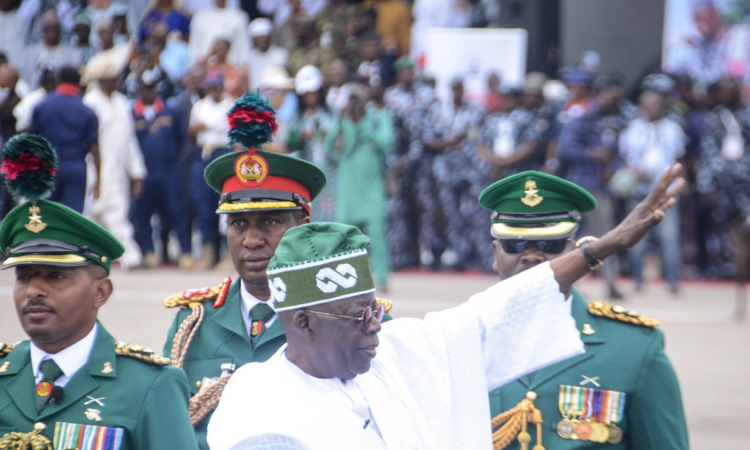
President Bola Tinubu has taken daring steps to stabilize Nigeria’s public finances, but more is needed to realize the potential of the richly endowed country.
From several critical perspectives, the last eight years was a period of lost opportunity for Nigeria. President Muhammadu Buhari (2015-2023) promised to improve the economy and security and crack down on corruption. However, during his two terms following the 2015 general election – which generated high hopes – Nigeria’s economic and security outlook deteriorated. The country’s influence in the region and on the African continent has weakened while internal challenges, like nation-building and improving federalism, remain unresolved.
Since May 29, 2023, newly elected President Bola Tinubu has faced a narrow window of opportunity to introduce reforms. However, the outlook for Africa’s most-populous country and largest economy remains clouded.
Until recently, Nigeria had the highest number of destitute people living below $1.90 per day (India assumed this dubious mantle in 2022). According to official data, two-thirds of Nigerians live in multidimensional poverty (a measure of household poverty along three dimensions: monetary, education and basic infrastructure). With a median age of 18, the country will soon reach a demographic window of opportunity, a situation when the ratio between dependents in the population and the working-age group is the most advantageous.
Unfortunately, due to President Buhari’s failure to respond to the challenges and seize on opportunities of high population growth, the country is at risk of falling into the trap of demographic fatigue – proving unable to respond to multiple stresses caused by high fertility.
Over the past eight years, Nigeria’s economic growth was slow and interrupted by two recessions, in 2016 and 2022. The mediocre performance can be attributed to external shocks, such as the commodity price crashes in 2014-2015 and 2022, and the effects of the pandemic. However, it was also the result of policy choices. Generally, the combination of weak economic growth and the ongoing demographic explosion inevitably pushes up poverty rates: 13 million Nigerian residents living in this condition will have been added between 2019 and 2025, according to the World Bank baseline projection. Alarmingly, two-thirds of Nigerian youths are either unemployed or underemployed.
The country is also sinking deeper into debt. It has entered a vicious cycle, repeatedly funding budget deficits with more borrowing. From 2016 to 2023, Nigeria’s deficit financing has risen by 370.5 percent, according to the country’s budget office. In 2022, according to the World Bank, debt servicing consumed 96.3 percent of Nigeria’s revenue (although the country’s finance minister has disputed that, claiming the actual figure was 80.6 percent).
The Nigerian government’s choice to monetize the deficit (the practice of borrowing money from the central bank to finance public expenditure) further accelerated inflation. It reached 18.8 percent, a 21-year high, in 2022. Foreign direct investment (FDI) dramatically decreased between 2014 and 2022, from $2.2 billion to $470 million, and in 2018, Ghana overtook Nigeria as the main investment destination in West Africa.
The economic and security outlooks are interconnected. Poverty is one of the drivers of crime, banditry, radicalization and ethnic tension, while stability and security are necessary conditions for growth and development.
President Tinubu faces security challenges in all of Nigeria’s six geopolitical zones. In the North East, Boko Haram has been weakened after the 2021 death of its leader, Abubakar Shekau. However, other groups, like the Islamic State West Africa Province or Ansaru (the Vanguard for the Protection of Muslims in Black Africa), are increasing their operational and recruitment reach beyond the region. In the North West, organized banditry has increased, along with the number of gangs and ethnic militias.
In the country’s middle belt, there is an ethnic-communal conflict between herders and farmers over land and water. During former President Buhari’s rule, there was also a revival of Biafra separatism. In the South West region, pipeline vandalism and oil theft, in which public officials take part, had reached unprecedented levels. By 2022, Nigeria was losing 470,000 barrels of oil a day to oil theft, according to the Nigerian National Petroleum Corporation Ltd (NNPC).
Amid ongoing fuel scarcity and food inflation, the risk of riots in urban areas remains a sword of Damocles hanging over the head of the government.
Like his predecessor, President Tinubu starts with a program prioritizing the economy and security. But while he comes from the same party, the All Progressives Congress, Mr. Tinubu departs from its statist and protectionist practices.
In 2022, the cost of importing refined oil products topped the income from crude oil exports. As a result, the country was financially hit by rising global prices despite being a major oil producer.
As expected, the new president’s first important policy decision was ending the fuel subsidy, as he announced at his inauguration. The subsidy had been in place since the 1970s when it was introduced to mitigate the effects of rising oil prices. In 2012, then-President Goodluck Jonathan eliminated the budget-busting program. However, the announcement led to weeks of violent protests and strikes and the emergence of the Occupy Nigeria protest movement. The subsidy was eventually restored.
Nigeria is Africa’s top oil producer but imports around 90 percent of the refined petroleum products it needs for domestic consumption. Crude oil production, the country’s main source of revenue, declined by almost 40 percent between 2012 and 2021 due to a cumulation of factors, including lack of investment, deterioration of infrastructure, mismanagement and oil theft. In 2022, the cost of importing refined oil products topped the income from crude oil exports. As a result, the country was financially hit by rising global prices despite being a major oil producer.
Energy will be a crucial domain for the new administration. Adopting the Petroleum Industry Act in 2021 and the privatization of the NNPC in 2022 created the conditions for restructuring the sector. President Tinubu is expected to deliver it through the “Energy Vision 2030” plan, which sets an ambitious target of expanding production capacity to 4 million barrels daily. It also commits the government to sell major stakes of the NNPC, now held by the petroleum and finance ministries.
Shortly after coming into office, Mr. Tinubu – a United States-trained accountant before entering politics – also changed the course of Nigeria’s monetary policy. The governor of the Central Bank of Nigeria has been replaced, fixed exchange rates have been abandoned and the national currency, the naira, now trades freely at market-defined rates.
Sources: IMF, World Bank, Nigeria National Bureau of Statistics, CIA World Factbook
The new administration is also expected to introduce changes in foreign policy to rebuild Nigeria’s influence within the African Union. President Buhari’s rule coincided with AU reforms and deeper trade integration with the 2018 African Continental Free Trade Area (ACFTA) enactment. Nigeria, however, was one of the last countries to sign and ratify the agreement, as Mr. Buhari preferred a protectionist approach. Another concern is restoring Nigeria’s position as the Economic Community of West African States (ECOWAS) leader.
On the international stage, Nigeria has expressed its desire to join BRICS (a grouping of world economies of Brazil, Russia, India, China and South Africa) along with Ethiopia, Egypt and Algeria. It will send a delegation to the group’s next summit in Johannesburg in August. Considering the competition between geopolitical blocs, Nigeria joining BRICS could create tension between Abuja and Washington.
As he faces the country’s economic and security challenges, the new president holds some trump cards. The first is that voters tend to give the benefit of the doubt to recently elected leaders. While Nigeria’s powerful labor unions announced strikes and protests after removing the fuel subsidy, they eventually suspended them and initiated talks with the government. The scrapping of the popular but costly measure, in effect for 50 years, did not come as a surprise, and there was a growing consensus among decision-makers that the subsidy was not sustainable.
Another advantage of the president is his record of success in the country’s largest city, the so-called “Lagos model” – which according to his supporters, could be replicated nationally. As governor of Lagos between 1999 and 2007, Mr. Tinubu presided over a period of growth in the local economy and the metropolis, attracting investment and innovation.
However, the new president has some weaknesses too. He was elected with only 27-percent voter turnout, the lowest since the country’s 1999 transition to democracy, and his victory is being challenged in the courts. The elections’ results are not expected to be nullified, given the informal but almost iron-clad rule of Nigerian politics that the presidency rotates between the country’s three main ethnic groups and the south and northern regions. This practice favored Mr. Tinubu’s victory, but his political position is now precarious.
Lacking decisive popular support, the president is already navigating challenging waters. The population, especially in urban areas, feels the impact of his decisions: fuel price increases are leading to higher transport costs, with soaring food prices.
There are, however, also tentative signs of positive change. The country’s daily petroleum consumption has dropped by 28 percent since the fuel subsidy ended in May – from the previous average of almost 70 million liters to a notch above 48 million liters in June 2023, according to official data.
Oil production has increased in 2023, as has the country’s processing capacity. The Dangote Refinery, a $18.5 billion megaproject first announced in 2013, was inaugurated in May. It is expected to reach a full processing capacity of 650,000 barrels per day before the year’s end. The Port Harcourt Refinery also aims to become operational later in 2023.
In a report last year, this author observed that regardless of who would win the 2023 presidential elections and how enlightened the new president’s reforms would be, Nigeria’s problems were such that it would take many years to reap their benefits, even under the best-case scenario.
President Tinubu is in a race against time. Instability will likely return in 2024, or even before, as citizens in urban areas cope with the higher cost of living. The evolution of oil prices and domestic oil production will define the new administration’s ability to avoid unrest and a potential political uprising without reversing its pro-market reforms.
The oil and gas sector accounts for about 65 percent of Nigeria’s revenue and more than 85 percent of its total exports. The economy will not escape this overdependency in the short to medium term.
Terrorist groups may put up another roadblock to economic growth if their operational reach continues to expand. Islamic State, a transnational militant Islamist terrorist organization, already exhorts its Middle East and Asia supporters to relocate to Africa. That creates additional challenges for states in Western Africa, particularly for Nigeria. At the same time, emigration remains high, especially among young people. While this increases remittances, a critical source of income for the Nigerian economy, it also harms the country’s future by extending the brain drain.
However, Nigeria is not about to join the ranks of failed states. Despite the challenges to state sovereignty in the periphery, whether from terrorism, banditry or separatism, the central state has been able to retain the core of political power and legitimacy. And despite the clamor for deep political reform, there are no alternative movements to replace the current regime or the country’s political elite.
Security institutions like the police and army – while underfunded, weakened by corruption, and often spread thin by multiplying security challenges – remain operational and under the command of political power. And while the economic situation remains precarious, oil income saves the day in Nigeria (like in Angola). Political fragmentation or financial collapse scenarios remain unlikely for now – unless the governing business-as-usual continues against all hopes.
Receive insights from our experts every week in your inbox.
Information about what personal data we collect about you and how we process it (including information about how we personalize our website for you and deliver content tailored to you) can be found in our privacy policy.
Show all reports
View this report on the web:
https://www.gisreportsonline.com/r/president-tinubu/
Report published:
August 2, 2023
Document version/created:
June 22, 2024


